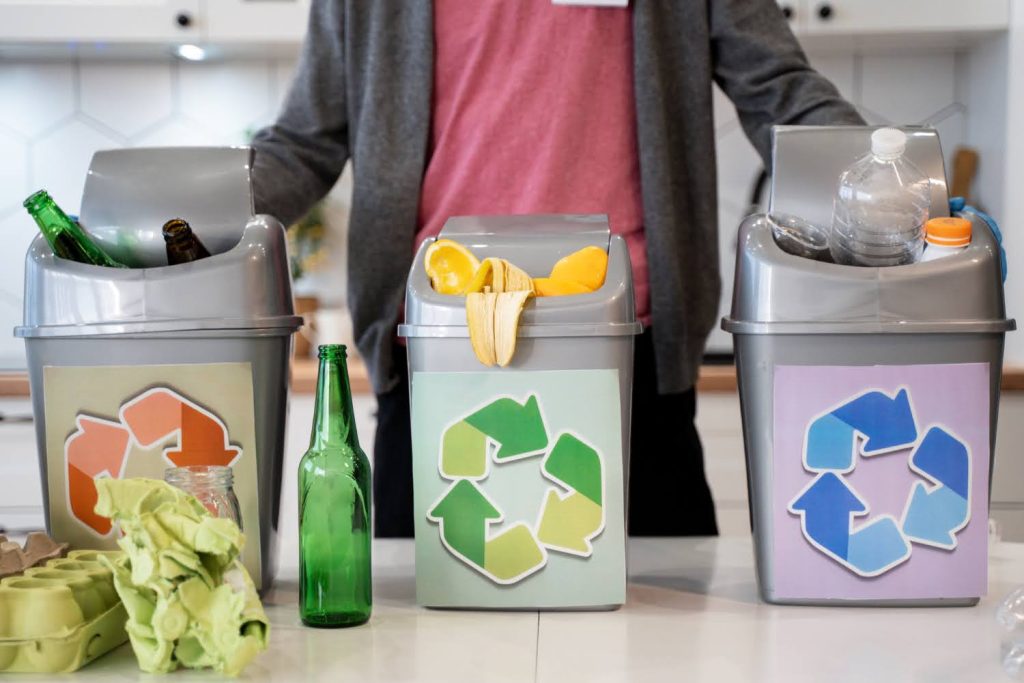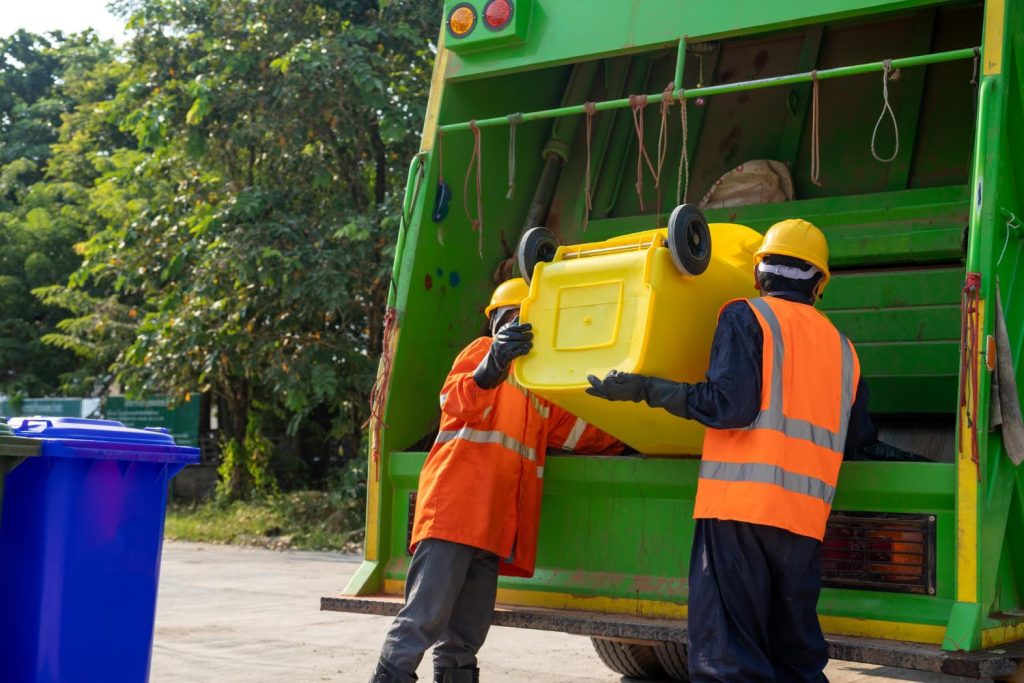Thinking about implementing sustainable waste management in your business? As our world evolves, your business needs to adapt too. Embracing sustainable waste management isn’t just a win for the planet, it’s a smart choice for your business as well.
We’re eager to present 10 compelling reasons for you to embark on this journey, offering benefits from financial savings to enhancing your brand’s appeal to customers.
And don’t worry, you’re not in this alone. Our article includes insights on how commercial cleaning service providers can be invaluable partners in integrating sustainable waste management seamlessly into your daily operations.

What Is Sustainable Waste Management And Why Is It Important?
Sustainable waste management is an environmentally conscious approach that addresses the challenges of proper waste disposal and anticipates future environmental needs.
It’s about reducing and avoiding the creation of waste, particularly single-use plastics, and simultaneously boosting the amount of materials being recycled.
This method integrates thoughtful waste reduction, such as opting for reusable or biodegradable materials, with innovative recycling practices, ensuring a significant decrease in the environmental impact of waste.
A notable example is the approach taken by companies like Greenpac, which has made significant strides in sustainable packaging.
Greenpac redesigned its client’s packaging from a polypropylene moulded case to a lighter paper carton box with polyethylene foam, effectively reducing the packaging weight and material used, thereby saving resources and costs.
This initiative significantly reduced packaging waste and demonstrated how sustainable design can lead to economic benefits.
For more detailed information about Greenpac’s sustainable waste management practices and their impact, you can refer to the full article here.
10 Benefits Of Sustainable Waste Management
Having explored the importance of sustainable waste management and delved into practical examples, it’s now crucial to understand the wide-ranging benefits of these practices.
The advantages are comprehensive, from reducing pollution and conserving natural resources to boosting economic growth and promoting public health. Let’s delve into the 10 primary benefits of sustainable waste management.
Environmental Benefits
1. Reduce Greenhouse Gas Emissions And Pollution
Reducing greenhouse gas emissions and pollution is a crucial benefit of sustainable waste management. When waste is properly managed, the amount going to landfills is significantly reduced. Landfills are known for being major sources of methane, a potent greenhouse gas.
Therefore, we can substantially lower methane emissions by diverting waste from landfills and opting for more sustainable waste management practices, such as implementing comprehensive recycling programs and promoting organic waste composting.
These methods reduce the amount of waste in landfills and transform waste into valuable resources, further mitigating environmental impact.
In addition to reducing greenhouse gases, sustainable waste management plays a vital role in decreasing various forms of pollution.
Recycling and composting can limit air pollution caused by waste incineration. It also reduces water and soil pollution by preventing the leaching of hazardous materials from landfill sites.
2. Conservation Of Natural Resources
Conserving natural resources is a key advantage of sustainable waste management. When we focus on recycling and reusing materials, the demand for new raw materials significantly decreases.
For instance, a commercial building that recycles paper and cardboard can drastically reduce the demand for virgin timber, preserving forests and the energy and water needed for paper production.
Likewise, factories that recycle metals like aluminium and steel save on the costs associated with raw material procurement and play a crucial role in reducing the need for energy-intensive mining activities.
Every step commercial properties take towards sustainable waste management, whether through recycling, reusing, or efficiently managing resources, has a substantial positive impact on conserving natural resources.
This not only benefits the environment but also supports the long-term sustainability and operational efficiency of the businesses themselves.
3. Reduced Reliance On Landfills
Landfills, essentially a finite resource, are becoming increasingly unsustainable due to space constraints and environmental concerns. Commercial properties can play a vital role in lessening the burden on these sites by adopting sustainable waste management practices.
A commercial company that implements an extensive recycling program for paper, plastics, and metals reduces the volume of waste sent to landfills. Similarly, businesses that focus on composting organic waste, like food scraps from a cafeteria, can convert this waste into useful compost, thereby avoiding adding to landfill volumes.
These practices are not just environmentally responsible but also economically beneficial. Commercial establishments can lower their waste disposal costs by cutting down the amount of waste sent to landfills.
This reduced reliance on landfills also contributes to a cleaner, more sustainable environment, aligning with broader corporate social responsibility goals.
Economic Benefits
4. Cost Saving
Adopting sustainable waste management practices, like recycling and composting, leads to substantial cost reductions for commercial properties. When businesses actively divert waste from landfills, they contribute to environmental preservation and see a noticeable decrease in waste management expenses.
An office segregating and recycling paper, plastics, and metals can reduce waste volume sent to landfills, thereby reducing disposal fees.
Similarly, restaurants or cafeterias that compost organic waste diminish their waste collection costs and can use the compost for landscaping, adding value to the business. While environmentally sound, these practices also make financial sense, helping companies to manage their operating costs more effectively.

5. Save Money On Waste Disposal And Create Jobs
Sustainable waste management has significant environmental benefits and offers economic advantages, particularly for commercial properties.
When businesses focus on reducing, recycling, and composting waste, they naturally decrease the volume of waste that needs to be disposed of professionally. This reduction can lead to lower fees for waste collection and disposal.
Commercial buildings that successfully implement a recycling program can lessen the frequency of waste pickups and the size of dumpsters needed, thus reducing waste management expenses.
In addition to cost savings, sustainable waste management practices can spur job creation in the green economy. These activities require a workforce for various processes like collection, sorting, processing, and selling recycled materials.
A commercial property that sets up a comprehensive recycling program might need to hire additional staff for sorting recyclables or managing the recycling centre.
These roles boost the local economy and create job openings in industries focused on environmental sustainability. Commercial properties can significantly contribute to economic development by implementing sustainable waste management methods.
Health Benefits
6. Reduced Exposure To Harmful Pollutants
Reducing exposure to harmful pollutants is a primary health benefit of sustainable waste management, especially in commercial property settings.
Traditional waste management methods can release toxic pollutants like methane, a potent greenhouse gas, and volatile organic compounds (VOCs). These VOCs can irritate the eyes, nose, and throat and are often linked to respiratory problems.
By implementing sustainable practices like waste segregation, recycling, and composting, businesses can significantly reduce the amount of waste going to landfills and releasing these harmful pollutants. This can help to improve air quality and reduce the risk of respiratory illnesses among employees and customers.
7. Improved Indoor Air Quality
Commercial properties can be breeding grounds for mould and mildew, particularly where waste is stored or disposed of improperly. These organisms can release allergens and irritants that trigger respiratory problems and worsen conditions like asthma.
Sustainable waste management techniques can enhance indoor air quality by minimising decomposable organic materials, such as food scraps and plant debris, which can break down and emit harmful spores.
Composting organic waste in a controlled environment prevents the buildup of decomposing materials inside the property, thereby reducing the risk of mould growth. This creates a healthier space for everyone who occupies the space.
8. Reduced Risk Of Pest Infestation
Food waste attracts pests like rodents and insects, which can carry diseases and contaminate food and surfaces. In restaurants, supermarkets, and office buildings with catering facilities, the accumulation of food waste can quickly lead to pest problems.
Implementing sustainable waste management strategies, like composting food scraps, can significantly reduce the risk of pest infestations. This also helps to protect the health of employees and customers and prevents the spread of disease.
Business Compliance And Social Responsibility
9. Compliance With Environmental Regulations
Singapore is known for its environmental policies designed to ensure businesses operate in a way that minimises their ecological impact.
Commercial properties must follow specific waste management guidelines under NEA regulations. These include proper waste disposal, recycling initiatives, and in some cases, waste reporting.
By adopting sustainable waste management practices, businesses in Singapore can stay ahead of these regulations and avoid potential penalties and fines.
For non-compliance under the Hazardous Waste (Control of Export, Import and Transit) Act, a corporation found guilty of contravening the act can face fines up to $300,000. Meanwhile, individuals may be fined up to $100,000 or face imprisonment for up to two years, or both.
By meeting and exceeding regulatory requirements, businesses can also position themselves as industry leaders in sustainability, which can be beneficial in attracting environmentally conscious customers and partners.
10. Positive Social Impact
Adopting sustainable waste management practices can significantly enhance a company’s public image and relations in today’s increasingly eco-conscious consumer market, particularly in Singapore, where environmental awareness is high.
One notable company that did this is Sustenir Superfoods. They have gained recognition for their sustainable approach by growing fresh leafy greens in controlled environments, using significantly less water and generating lower carbon emissions than imported produce.
This commitment to sustainability positions the company as an eco-friendly choice and strengthens its relationship with customers and the community who value environmental responsibility.
Examples Of Sustainable Waste Management Practices In Singapore
Singapore has been a leader in implementing sustainable waste management practices, especially in commercial properties like offices, factories, restaurants, schools, and nursing homes.
Here are seven examples that you can implement if you haven’t yet.
Recycling Programs
Implementing comprehensive recycling programs for materials like paper, plastic, metal, and glass. Offices can set up dedicated recycling stations where employees can segregate paper, plastic, metal, and glass.
For instance, a colour-coded bin system – blue for paper, red for plastic, yellow for metal, and green for glass – makes sorting easier.
Food Waste Management
Many commercial properties in Singapore have started food waste management practices. This includes using food waste digesters to convert food waste into water or compost, which can be used for gardening or landscaping within the property.
E-Waste Recycling
E-waste recycling is crucial with the increasing use of electronic devices. Singapore has special programs for collecting and recycling electronic waste, including computers, batteries, and mobile phones.
One of these programs is the National Voluntary Partnership for E-waste Recycling, which was initiated by Singapore’s National Environment Agency (NEA) in collaboration with electronic retailers and manufacturers.
They set up collection points for e-waste, ensuring easy accessibility for consumers to responsibly dispose of their electronic items.
Green Procurement Policies
This encourages purchasing environmentally friendly and sustainable products. This includes buying recycled products and biodegradable materials and reducing the use of single-use plastics.
For instance, businesses can opt for office supplies made from post-consumer waste, like recycled paper and biodegradable cleaning products, and replace single-use plastics with reusable or compostable alternatives in food services and restrooms.
Eco-Design And Sustainable Packaging
Adopting eco-design principles in product development and using sustainable packaging materials to reduce waste generation. This can include using recyclable materials, minimising packaging, or designing products for longer life and easier recycling.
Businesses can utilise packaging made from recycled materials or plant-based bioplastics and design products with modular components for easy repair and recycling.

How Commercial Cleaners Can Help With Waste Management
Hiring commercial cleaning services is vital in maintaining the cleanliness and hygiene of any business. However, their scope can extend beyond just cleaning floors and surfaces. They can also be valuable partners in ensuring proper waste management, which is critical for environmental sustainability and cost efficiency.
- Expertise: Commercial cleaners possess in-depth knowledge and expertise in managing various waste streams, including hazardous materials, which is vital for businesses under industries with strict waste disposal regulations.
Their expertise extends to understanding the complexities of different types of waste, such as chemical, biological, or electronic waste, and they are trained in handling and disposing of these materials safely.
This knowledge ensures that businesses comply with environmental laws and regulations, reducing the risk of legal penalties and enhancing their reputation for responsible waste management.
- Efficiency: Commercial cleaners can significantly improve the efficiency of waste management tasks. They have the right equipment for quick and effective waste collection and disposal, including automated lift systems, biodegradable bags, reusable cloths, and green cleaning products.
By outsourcing waste management to commercial cleaners, businesses can free up their employees’ time and resources, allowing them to focus on important activities and productivity, ultimately contributing to better operational efficiency.
- Cost-effectiveness: Hiring a commercial cleaning service for waste management is often more cost-effective than handling waste in-house, particularly for businesses that generate significant amounts of waste.
Additionally, they can often negotiate better rates for waste disposal due to their larger volume, and their expertise can minimise the risk of costly errors or compliance issues. This makes it an affordable choice for businesses looking to manage their waste disposal budget effectively.
Conclusion About The Benefits Of Sustainable Waste Management
Adopting sustainable waste management in commercial settings is more than an environmental gesture; it’s a strategic choice with far-reaching benefits. This approach aligns with ecological standards, fosters economic efficiency, and strengthens public perception.
ESP Cleaning offers expert assistance for companies needing help with the proper disposal and handling of industrial waste according to legal and environmental standards. We also provide industrial cleaning services that help implement effective recycling and waste management systems.
To explore how we can support your sustainable waste management efforts and request a non-obligatory quote, contact ESP Cleaning. Let’s work together towards a cleaner, greener future.
Frequently Asked Questions About The Benefits Of Sustainable Waste Management
What Are The Effects Of Improper Waste Management?
Improper waste management leads to environmental pollution, serious health risks, and increased greenhouse gas emissions. It can also result in legal and financial penalties for non-compliance with waste management regulations.
Why Are Commingled Recycling Bins Used In Singapore?
Singapore uses commingled recycling bins to make recycling more accessible and cost-effective. Residents can place all recyclables in one bin without needing to sort, simplifying the process and encouraging more participation in recycling.
Why Don’t We Need To Sort Our Recyclables In Singapore?
Recyclables are not sorted at commercial establishments; they are sorted later at material recovery facilities. This approach aims to make recycling convenient and increase household participation.
What Waste Management Services Do Professional Cleaners Provide?
They offer comprehensive services like recycling, effective segregation of waste, safe disposal of hazardous materials, and employing eco-friendly cleaning methods, all tailored to your business’s needs.
Can Cleaners Assist With Regulatory Compliance?
Yes, professional cleaners are well-versed in local and federal waste management regulations, ensuring your business adheres to these laws and avoids potential fines or legal issues.

